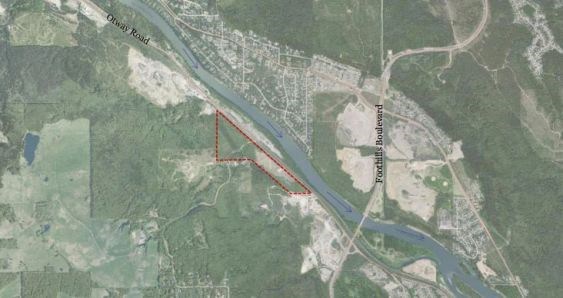The arguments went on late into the city hall night. By deadline, speakers were still lined up to make their presentations, and the interested parties spilled out of the main chambers and into a second meeting room with a screen showing the proceedings.
The discussion centred on whether mayor and council should change the zoning of a 12-hectare parcel of land on Otway Road. It is currently zoned for agricultural and forestry purposes, and is outfitted with a helicopter hangar. It is across the Nechako River from a significant community of homes.
The change would turn it into a light industrial parcel and would be home to the activities of two companies: Timber West Mill Construction and CIF Construction Ltd.
The lineup of speakers at the public hearing (the second held by mayor and council on this subject) was set to include both supporters and opponents of the project, but the only one in favour of the plan to reach the microphone Monday night was real estate representative Clint Dahl. He called the proposed plan "a win-win" for the companies and the neighbourhood, since it would generate economic activity and as the land currently sits, other less desirable uses of the land could start up without public consultation "like a pig farm, or a chicken farm or cattle," implying farm use was negative in that area.
With all the concessions Timber West and CIF were willing to make in exchange for favourable zoning, he said, the community good was well served.
Opponents lined up to call foul.
One speaker pointed out that the gift of land was contingent on getting the zoning they wanted, so it was no gift at all but a municipal bribe.
It was also pointed out that this land was currently being taxed and, if gifted to the city, would let them off the tax hook while also subtracting that income from the municipal bank accounts.
Another speaker measured out how far an industrial operation must be from the next nearest residence in order to be compliant with dangerous goods regulations and it turned out the donation of the land would move their property line to compliance distance with the closest home.
The speakers who got to the microphone each took turns reiterating the concerns of the neighbours over the noise, light, air and water pollution already going on in that area, and this would ramp those levels up. A previous city council-commissioned study of that area's water supply deemed the aquifer there as "vulnerable" especially to surface-borne pollution that would easily gather into the drinking water of the region.
One speaker in particular, heavy-duty mechanic Mike Ulrich, said "I have 80,000 hours of experience in this field; that should be worth something, right?"
He then detailed the kinds of chemicals, the kinds of noise and the kinds of hazards the proposed operation would cause, especially the stuff that would hypothetically leak or drain into the water table.
He went so far as to bring in a small handheld impact wrench to demonstrate how quiet they sound when fired into the air, but how loud they became when applied to a steel component.
Sandra Taylor explained how she and some others called around to various real estate agents of the city inquiring about land already zoned light-industrial to discover there were ample acres already set up for such activities and available for purchase.
That land was of a higher price, though, she said, posing the suggestion that these companies stood to gain financially by meddling with the real estate market. They could buy it cheaply under the current zoning only to see that investment skyrocket if the light-industrial sticker got tagged on the next For Sale sign.
Among the arguments made by Phil Mullins was an addition to Taylor's hypothesis. He said it was counter to the MyPG process and the creation of an Official Community Plan, but also out of step with basic economics.
A government drastically taints the local free-enterprise market if a set of land developers invests heavily in setting up light-industrial properties, he said, only to have the municipal government devalue their land and their up-front cash by A) letting a purchaser steer clear of their offering for land that wasn't in fair play and also B) now opening up a whole new industrial area to gut-punch the established supply and demand for that established real estate.
With so much land already set for those uses, a number of them said, why entertain such a contentious proposal where it is not wanted by the neighbourhood and may in fact be dangerous to the environment there.
The discussion was still ongoing and mayor and council far from making a decision as of press time.



